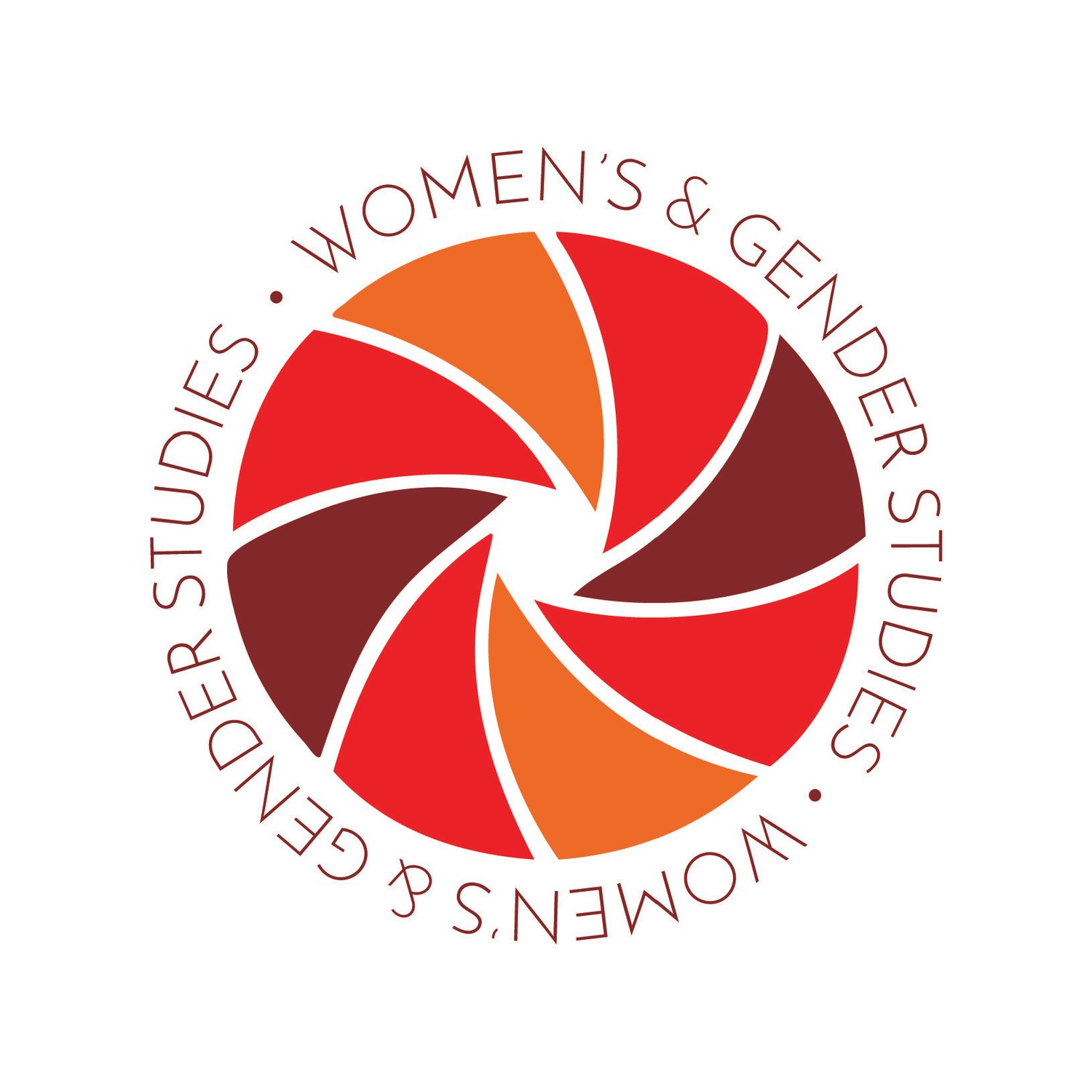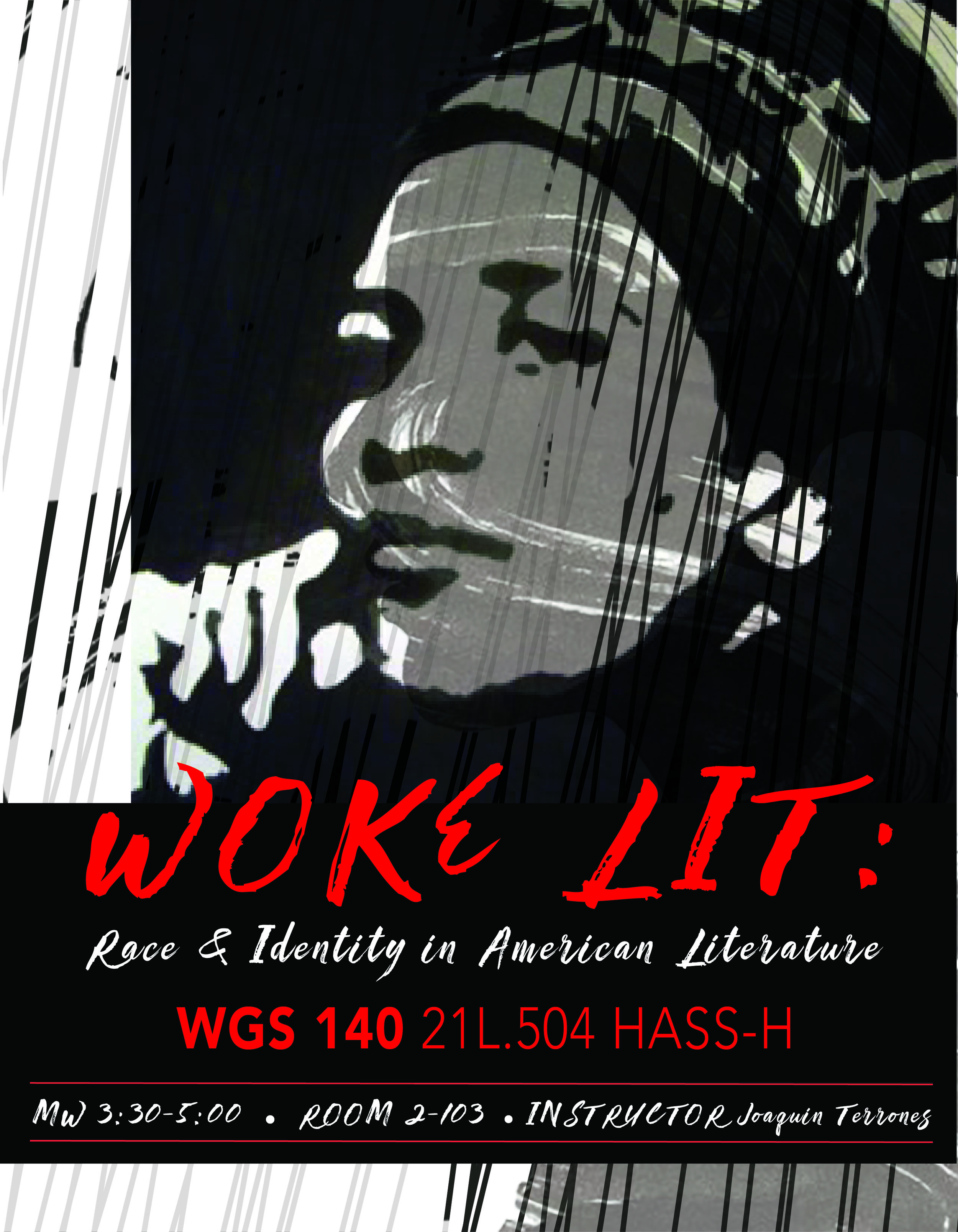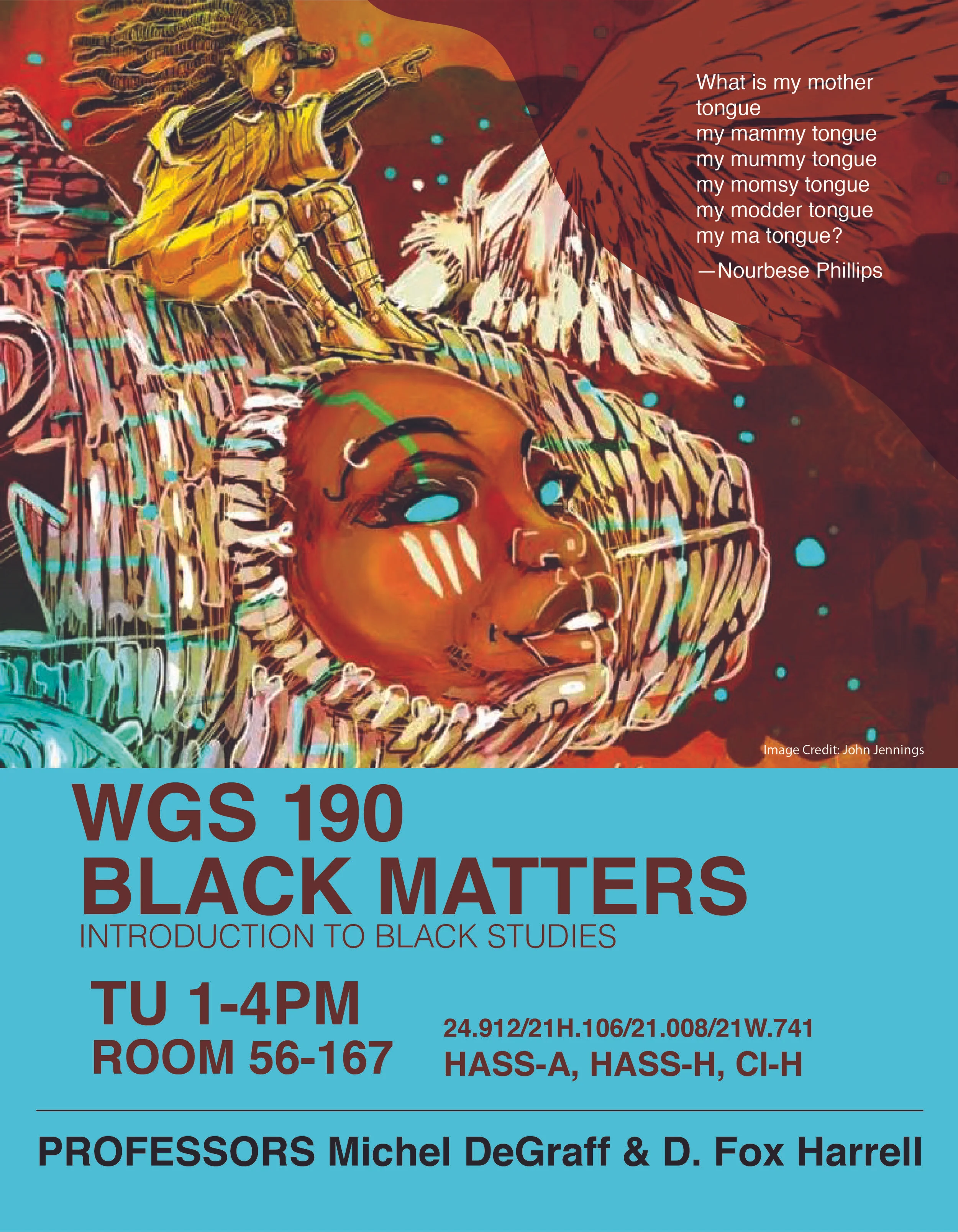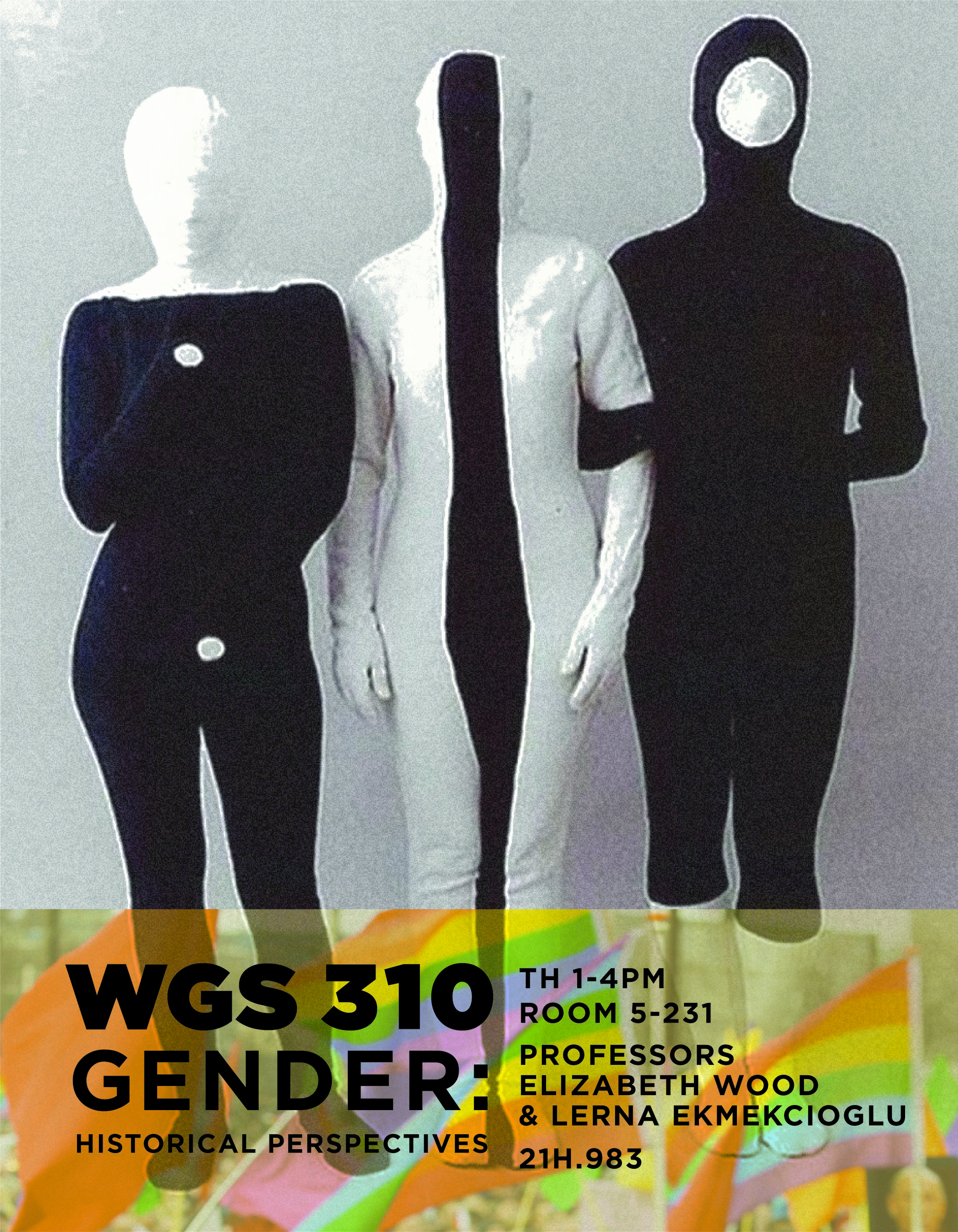WGS.101 Introduction to Women's and Gender Studies
Drawing on multiple disciplines - such as literature, history, economics, psychology, philosophy, political science, anthropology, media studies and the arts - to examine cultural assumptions about sex, gender, and sexuality. Integrates analysis of current events through student presentations, aiming to increase awareness of contemporary and historical experiences of women, and of the ways sex and gender interact with race, class, nationality, and other social identities. Students are introduced to recent scholarship on gender and its implications for traditional disciplines.
A. Walsh
Prereq: None
Units: 3-0-9
MW 3 - 4:30pm
Room 4-145
HASS-H, CI-H
Drawing on multiple disciplines - such as literature, history, economics, psychology, philosophy, political science, anthropology, media studies and the arts - to examine cultural assumptions about sex, gender, and sexuality. Integrates analysis of current events through student presentations, aiming to increase awareness of contemporary and historical experiences of women, and of the ways sex and gender interact with race, class, nationality, and other social identities. Students are introduced to recent scholarship on gender and its implications for traditional disciplines.
A. Walsh
WGS.109 Women and Global Activism in Media and Politics
An interdisciplinary subject that examines questions of feminism, international women's issues, and globalization through the study of novels, films, critical essays, painting and music. Considers how women redefine the notions of community and nation, how development affects their lives, and how access to the internet and to the production industry impacts women's lives. Primary topics of interest include transformations of traditional values, social change, gender role distribution, identity formation, migration flows, globalization and development, popular culture, urban life, cyber-culture, activism, and human rights. Limited to 25 when Writing Tutor is assigned to the class. Otherwise, limited to 18.
A. Sur
Prereq: None
Units: 3-0-9
T Th 9:30am - 11am
Room 4-146
HASS-H, CI-H
An interdisciplinary subject that examines questions of feminism, international women's issues, and globalization through the study of novels, films, critical essays, painting and music. Considers how women redefine the notions of community and nation, how development affects their lives, and how access to the internet and to the production industry impacts women's lives. Primary topics of interest include transformations of traditional values, social change, gender role distribution, identity formation, migration flows, globalization and development, popular culture, urban life, cyber-culture, activism, and human rights. Limited to 25 when Writing Tutor is assigned to the class. Otherwise, limited to 18.
A. Sur
WGS.111 Gender and Media Studies
Examines representations of race, gender, and sexual identity in the media. Considers issues of authorship, spectatorship, and the ways in which various media (film, television, print journalism, advertising) enable, facilitate, and challenge these social constructions in society. Studies the impact of new media and digital media through analysis of gendered and racialized language and embodiment online in blogs and vlogs, avatars, and in the construction of cyberidentities. Provides introduction to feminist approaches to media studies by drawing from work in feminist film theory, cultural studies, gender and politics, and cyberfeminism.
K. Surkan
Same subject as CMS.619
Prereq: None
Units: 3-0-9
T 7 - 10pm
Room 4-257
HASS-H
Examines representations of race, gender, and sexual identity in the media. Considers issues of authorship, spectatorship, and the ways in which various media (film, television, print journalism, advertising) enable, facilitate, and challenge these social constructions in society. Studies the impact of new media and digital media through analysis of gendered and racialized language and embodiment online in blogs and vlogs, avatars, and in the construction of cyberidentities. Provides introduction to feminist approaches to media studies by drawing from work in feminist film theory, cultural studies, gender and politics, and cyberfeminism.
K. Surkan
WGS.140 Woke Lit: Race & Identity in American Literature
Questions posed by the literature of the Americas about the relationship of race and gender to authorship, audience, culture, ethnicity, and aesthetics. Social conditions and literary histories that shape the politics of identity in American literature. Specific focus varies each term. Previously taught topics include Immigrant Stories, African American Literature, and Asian American Literature. May be repeated for credit with permission of instructor if the content differs.
J. Terrones
Same subject as 21L.504
Prereq: Permission of instructor
Units: 3-0-9
MW 3:30 - 5pm
Room 66-160
HASS-H
Questions posed by the literature of the Americas about the relationship of race and gender to authorship, audience, culture, ethnicity, and aesthetics. Social conditions and literary histories that shape the politics of identity in American literature. Specific focus varies each term. Previously taught topics include Immigrant Stories, African American Literature, and Asian American Literature. May be repeated for credit with permission of instructor if the content differs.
J. Terrones
WGS.151 Gender, Medicine, and Public Health
Draws on different disciplines, conceptual frameworks, and methodological approaches to examine gender in relation to health, including public health practice, epidemiologic research, health policy, and clinical application. Discusses a variety of health-related issues that illustrate global, international, domestic, and historical perspectives. Considers other social determinants of health as well, including social class and race. Limited to 25.
B. Charlton
Prereq: None
Units: 3-0-9
M 7 - 10pm
Room 4-257
HASS-S
Draws on different disciplines, conceptual frameworks, and methodological approaches to examine gender in relation to health, including public health practice, epidemiologic research, health policy, and clinical application. Discusses a variety of health-related issues that illustrate global, international, domestic, and historical perspectives. Considers other social determinants of health as well, including social class and race. Limited to 25.
B. Charlton
WGS.190 Black Matters: Introduction to Black Studies
Interdisciplinary survey of people of African descent that draws on the overlapping approaches of history, literature, anthropology, legal studies, media studies, performance, linguistics, and creative writing. Connects the experiences of African-Americans and of other American minorities, focusing on social, political, and cultural histories, and on linguistic patterns. Includes lectures, discussions, workshops, and required field trips that involve minimal cost to students.
M. DeGraff, D. Fox Harrell
Same subject as 24.912, 21H.106, 21L.008, 21W.741
Prereq: None
Units: 3-0-9
T 1 - 4pm
Room 56-167
HASS-A, HASS-H, CI-H
Interdisciplinary survey of people of African descent that draws on the overlapping approaches of history, literature, anthropology, legal studies, media studies, performance, linguistics, and creative writing. Connects the experiences of African-Americans and of other American minorities, focusing on social, political, and cultural histories, and on linguistic patterns. Includes lectures, discussions, workshops, and required field trips that involve minimal cost to students.
M. DeGraff, D. Fox Harrell
WGS.224 Race, Gender and Social Inequality: Reproductive Health Care in the United States
Explores the politics of reproductive health care delivery in the United States, with a particular focus on how clinical care is shaped by--and, in turn, shapes--social inequality along axes of race and gender. Considers a variety of reproductive health issues from multiple perspectives, drawing on readings from the fields of history, anthropology, sociology, medicine, epidemiology, and law. Develops skills to interrogate how each field conceptualizes and values reproductive health, both explicitly and implicitly. Introduces major conceptual issues foundational to understanding the politics of reproduction. Goes on to cover topics such as the human biofemale reproductive lifecycle and social movements explicitly organized around reproductive health. Limited to 40.
E. Janiak
Prereq: None
Units: 3-0-9
W 7 - 10pm
Room 4-144
HASS-S
Explores the politics of reproductive health care delivery in the United States, with a particular focus on how clinical care is shaped by--and, in turn, shapes--social inequality along axes of race and gender. Considers a variety of reproductive health issues from multiple perspectives, drawing on readings from the fields of history, anthropology, sociology, medicine, epidemiology, and law. Develops skills to interrogate how each field conceptualizes and values reproductive health, both explicitly and implicitly. Introduces major conceptual issues foundational to understanding the politics of reproduction. Goes on to cover topics such as the human biofemale reproductive lifecycle and social movements explicitly organized around reproductive health. Limited to 40.
E. Janiak
WGS.229 Race, Culture, and Gender in the US and Beyond: A Psychological Perspective
Examines the biopsychosocial factors which impact racial-ethnic identity, racial and cultural socialization, and experiences of prejudice, bias, discrimination, and racial microaggressions across gender identities. Reviews topics in multicultural psychology from the lens of challenging ethnocentric biases in the field. Critically evaluates the intersection of race with other social identities (e.g., gender, sexual identity, and socioeconomic status) and how it impacts human behavior. Using a case study approach, students integrate empirical evidence from international psychosocial research on oppression in order to provide more breadth in understanding the influence of race and gender upon human behavior. Develops multicultural competency skills essential for practice in clinical and non-clinical organizational settings. Limited to 25.
C. Kapungu
Prereq: None
Units: 3-0-9
Th 7 - 10pm
Room 14E-310
HASS-S
Examines the biopsychosocial factors which impact racial-ethnic identity, racial and cultural socialization, and experiences of prejudice, bias, discrimination, and racial microaggressions across gender identities. Reviews topics in multicultural psychology from the lens of challenging ethnocentric biases in the field. Critically evaluates the intersection of race with other social identities (e.g., gender, sexual identity, and socioeconomic status) and how it impacts human behavior. Using a case study approach, students integrate empirical evidence from international psychosocial research on oppression in order to provide more breadth in understanding the influence of race and gender upon human behavior. Develops multicultural competency skills essential for practice in clinical and non-clinical organizational settings. Limited to 25.
C. Kapungu
WGS.245 Identities and Intersections: Queer Literatures
Focuses on LGBT literature from the mid-19 century to the present, with an emphasis on fiction and poetry. In particular, analyzes how LGBT identities and their literary representations have changed over time. Covers authors such as Walt Whitman, Oscar Wilde, Virginia Woolf, James Baldwin, Audre Lorde, Cherrie Moraga, Melvin Dixon, Leslie Feinberg, and Luis Negron.
J. Terrones
Same subject as 21L.480
Prereq: None
Units: 3-0-9
MW 7 - 8:30pm
Room 4-146
HASS-H
Focuses on LGBT literature from the mid-19 century to the present, with an emphasis on fiction and poetry. In particular, analyzes how LGBT identities and their literary representations have changed over time. Covers authors such as Walt Whitman, Oscar Wilde, Virginia Woolf, James Baldwin, Audre Lorde, Cherrie Moraga, Melvin Dixon, Leslie Feinberg, and Luis Negron.
J. Terrones
WGS.274 Images of Asian Women: Dragon Ladies and Lotus Blossoms
Explores some of the forces and mechanisms through which stereotypes are built and perpetuated. In particular, examines stereotypes associated with Asian women in colonial, nationalist, state-authoritarian, and global/diasporic narratives about gender and power. Students read ethnography, fiction, and history, and view films to examine the politics and circumstances that create and perpetuate the representation of Asian women as dragon ladies, lotus blossoms, despotic tyrants, desexualized servants, and docile subordinates. Students are introduced to debates about Orientalism, gender, and power.
M. Buyandelger
Same subject as 21A.141, 21G.048
Prereq: None
Units: 3-0-9
W 1 - 4pm
Room 66-154
HASS-S
Explores some of the forces and mechanisms through which stereotypes are built and perpetuated. In particular, examines stereotypes associated with Asian women in colonial, nationalist, state-authoritarian, and global/diasporic narratives about gender and power. Students read ethnography, fiction, and history, and view films to examine the politics and circumstances that create and perpetuate the representation of Asian women as dragon ladies, lotus blossoms, despotic tyrants, desexualized servants, and docile subordinates. Students are introduced to debates about Orientalism, gender, and power.
M. Buyandelger
WGS.275 Gender, Race, and Environmental Justice
Provides an introduction to the analysis of gender in science, technology, and environmental politics from a global perspective. Familiarizes students with central objects, questions, and methods in the field. Examines existent critiques of the racial, sexual and environmental politics at stake in techno-scientific cultures. Draws on material from popular culture, media, fiction, film, and ethnography. Addressing specific examples from across the globe, students also explore different approaches to build more livable environments that promote social justice. Taught in English. Limited to 18.
B. Stoetzer
Same subject as 21G.057, STS.022
Prereq: None
Units: 3-0-9
W 7 - 10pm
Room 14E-310
HASS-H
Provides an introduction to the analysis of gender in science, technology, and environmental politics from a global perspective. Familiarizes students with central objects, questions, and methods in the field. Examines existent critiques of the racial, sexual and environmental politics at stake in techno-scientific cultures. Draws on material from popular culture, media, fiction, film, and ethnography. Addressing specific examples from across the globe, students also explore different approaches to build more livable environments that promote social justice. Taught in English. Limited to 18.
B. Stoetzer
WGS.301 Feminist Thought
Analyzes theories of gender and politics, especially ideologies of gender and their construction; definitions of public and private spheres; gender issues in citizenship, the development of the welfare state, experiences of war and revolution, class formation, and the politics of sexuality. Graduate students are expected to pursue the subject in greater depth through reading and individual research.
K. Surkan
Same subject as 17.007, 24.237
Prereq: None
Units: 3-0-9
M 7 - 10pm
Room 14E-310
HASS-H
Analyzes theories of gender and politics, especially ideologies of gender and their construction; definitions of public and private spheres; gender issues in citizenship, the development of the welfare state, experiences of war and revolution, class formation, and the politics of sexuality. Graduate students are expected to pursue the subject in greater depth through reading and individual research.
K. Surkan
WGS.310 Gender: Historical Perspectives
Examines the definition of gender in scientific, societal, and historical contexts. Explores how gender influences state formation and the work of the state, what role gender plays in imperialism and in the welfare state, the ever-present relationship between gender and war, and different states' regulation of the body in gendered ways at different times. Investigates new directions in the study of gender as historians, anthropologists and others have taken on this fascinating set of problems. Open to advanced undergraduates with permission of instructor.
L. Ekmekcioglu, E. Wood
Prereq: None
Units: 3-0-9
Same subject as 21H.983
F 10 - 1pm
Room 5-232
Examines the definition of gender in scientific, societal, and historical contexts. Explores how gender influences state formation and the work of the state, what role gender plays in imperialism and in the welfare state, the ever-present relationship between gender and war, and different states' regulation of the body in gendered ways at different times. Investigates new directions in the study of gender as historians, anthropologists and others have taken on this fascinating set of problems. Open to advanced undergraduates with permission of instructor.
L. Ekmekcioglu, E. Wood














